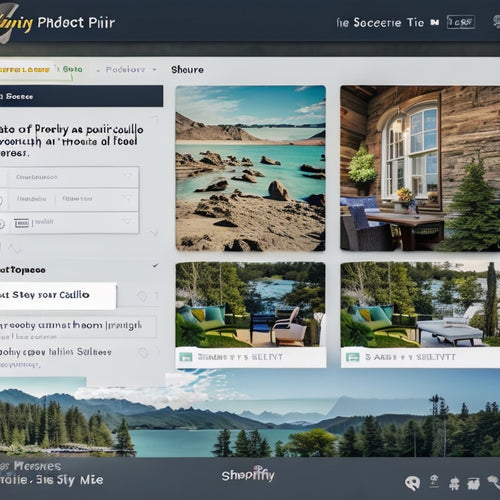
Revolutionize E-Learning Transactions With Merchant Accounts
Share
E-learning platforms seeking to enhance their transactions can leverage merchant accounts to facilitate seamless online payment acceptance. In a market projected to exceed $300 billion by 2025, integrating merchant accounts is essential for e-learning platforms to stay competitive. Key considerations include payment gateway essentials such as payment methods, fee structures, and e-wallet integration, as well as secure payment solutions that prioritize user information protection and compliance with industry standards. By optimizing their payment infrastructure, e-learning platforms can enhance user experience, improve conversion rates, and establish trust with their customers. Explore the full potential of your e-learning platform by delving into the intricacies of merchant account integration.
Key Takeaways
• Integrate a merchant account to facilitate seamless online payment acceptance and enhance the overall e-learning experience.
• Offer a range of payment methods, including digital wallets, to cater to the diverse preferences of Gen Z and millennials.
• Ensure secure payment solutions that prioritize user information protection and uphold industry compliance with standards like PCI-DSS and SSL encryption.
• Select a payment gateway that supports recurring billing and e-wallet integration to optimize conversion rates and user satisfaction.
• Implement tokenization and two-factor authentication to add an extra layer of security and prevent fraudulent transactions.
E-Learning Market Evolution
The e-learning market, poised to exceed $300 billion by 2025, has undergone a significant evolution in recent years, driven by the growing demand for online learning platforms and the increasing adoption of digital payment methods among Gen Z and millennials.
This demographic shift has led to a surge in mobile payment trends, with young adults preferring convenient and secure payment options. E-learning demographics reveal that the majority of consumers are between 18 and 35 years old, with a strong affinity for mobile devices and digital wallets.
As a result, e-learning platforms must adapt to these mobile payment trends to stay competitive, offering seamless and user-friendly payment experiences that cater to the evolving needs of their target audience.
Payment Gateway Essentials
As e-learning platforms cater to the mobile payment preferences of their mostly Gen Z and millennial user base, selecting the right payment gateway becomes essential for seamless online payment acceptance. Payment gateway selection plays a key role in the user experience, influencing conversion rates and customer satisfaction.
When choosing a payment gateway, e-learning merchants should consider factors such as payment methods, fee structures, recurring billing, and geo-preferences. Additionally, e-wallet integration is vital for expanding global reach, as it facilitates quick and hassle-free payments.
Secure Payment Solutions
E-learning platforms must prioritize secure payment solutions to protect sensitive user information and prevent fraudulent transactions, thereby upholding trust and credibility in the online learning environment. Transaction security is paramount, and payment processing must comply with industry standards such as PCI-DSS compliance and SSL encryption.
Implementing tokenization and two-factor authentication provides an additional layer of security for users. In addition, partnering with a reliable payment gateway and acquiring bank guarantees that payment processing is handled efficiently and securely.
Frequently Asked Questions
Can E-Learning Platforms Accept International Payments With a Domestic Merchant Account?
E-learning platforms can accept international payments with a domestic merchant account, but it's essential to take into account cross-border transaction fees and currency conversions, ensuring seamless payment processing and minimizing exchange rate losses.
Do Alternative Payment Methods Like Crypto Require Separate Merchant Accounts?
Alternative payment methods like crypto often require separate merchant accounts due to distinct regulatory requirements, such as Crypto Regulation, and enhanced security measures, including Blockchain Security, to guarantee smooth and secure transactions.
How Do E-Learning Platforms Handle Payment Processing for Subscription-Based Courses?
E-learning platforms handle payment processing for subscription-based courses by leveraging payment gateways that support recurring payments and course bundles, ensuring seamless transactions and efficient revenue management through automated billing and subscription tracking.
Are There Any Specific Payment Gateways Optimized for E-Learning Businesses?
As e-learning platforms navigate the complex landscape of payment processing, a burning question emerges: are there payment gateways specifically optimized for education payments? Indeed, learning gateways like PayPal, Stripe, and Braintree offer tailored solutions for seamless education payments.
Can E-Learning Platforms Customize Their Payment Pages With White-Label Gateways?
Yes, e-learning platforms can customize their payment pages with white-label gateways, ensuring a seamless experience and preserving brand identity by tailoring payment interfaces to match their unique visual and functional requirements.
Related Posts
-

What Are the Best Shopify SEO Strategies
The objective of this article is to analyze and present the best Shopify SEO strategies for e-commerce success. By e...
-

How Do I Add a Product Feed to Shopify
The integration of product feeds into Shopify offers numerous advantages for merchants seeking to enhance their onli...

